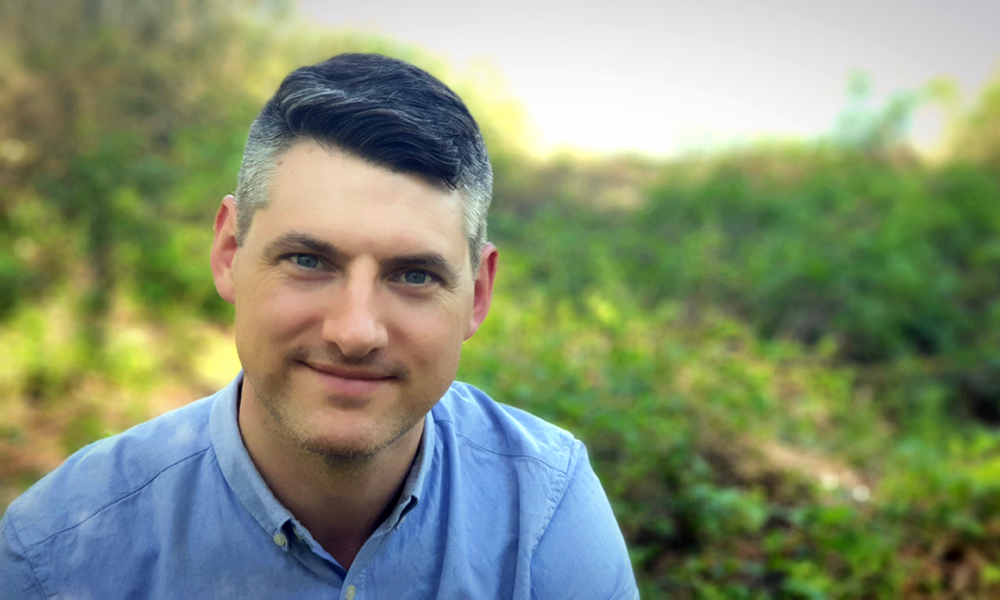
Welcome: Brendan Rouse
EMBL’s new Environmental Officer reflects on the role of organisations in responding to the challenges of climate change

Brendan Rouse came to Heidelberg in March as EMBL’s Environmental Officer, tasked with monitoring the organisation’s environmental impact and promoting sustainable practices. Here, he discusses his plans for the new role.
How did you first get interested in issues relating to the environment and sustainability?
At a very young age, thanks to an old cartoon called Captain Planet and the Planeteers. It taught me that polluters are the bad guys and environmentalists are the good guys! I’ve tried to be a good guy ever since, and decided to study environmental science at university.
What’s your professional background?
I’ve been a sustainability manager for 10 years now. I started at Great Ormond Street Hospital for Children in London, where I was the first Sustainability Manager and was able to develop a sustainability programme from scratch. We saved a lot of money and reduced our carbon footprint. Most importantly, we successfully engaged staff in using sustainability as a way of improving the outcomes for our patients and their families. It was a really inspirational place to work. After five years, I moved into the private sector and worked for two real estate companies in London. It’s been interesting to see how private companies now recognise sustainability as a critical factor for their long-term success.
Tell us about your role. What will be your main tasks and projects at EMBL?
I’m joining EMBL at a critical time in the fight against climate change and I see my role as ensuring EMBL responds appropriately to this challenge. I’ll be supporting the projects of the Green EMBL Working Group, which was set up in 2019 by EMBL group leaders Detlev Arendt and Kiran Patil. I also want to develop a strategy that demonstrates our commitment to reducing our impacts in line with the United Nations Paris Agreement. Some of the early work will include talking to colleagues throughout the organisation about developing a new travel policy, as well as setting up energy monitoring and reporting tools for the EMBL sites.
How do you think research at EMBL could help to tackle environmental issues?
Around the world, there’s been a lot of research on the impact climate change will have on different species and habitats, and EMBL research could also help us to understand these changes by studying their effects on organisms at the level of genes and molecules. It’s also vital that EMBL continues to improve our understanding of microorganisms, especially with regard to a warming climate. And it’s great to see EMBL’s involvement with the Tara Ocean Foundation, which has carried out research on marine biodiversity and the impact of microplastics on marine organisms.
Do you think we’re seeing an increase in people’s awareness of climate change?
I definitely think there’s been a change in awareness over the past year, fostered by activist movements and environmental disasters. In my work, there was a sudden switch from trying to get people to engage with the subject to being inundated with questions. We can all see how the world is changing around us and feel the uncertainty this brings to our children’s futures. The corporate world has responded, too. For example, last year the chief executive of my previous company was giving his annual results presentation, and his second slide was on our sustainability programme. This would have been unheard of only two years ago.
What are the major challenges for organisations in tackling issues around sustainability?
The level of change that’s needed is quite hard to grasp. There’s often a fear that tackling these issues will lead to organisations losing some competitive advantage. Once this mindset changes and people see the opportunities that being sustainable can bring, that’s one major hurdle overcome. There can also be a lack of political continuity, which hinders companies and organisations in developing long-term plans and investing with confidence.
What can research institutes like EMBL do to reduce their energy usage and carbon footprint?
So much! Direct energy emissions from combustion activities can be reduced by making sure our heating plant is running efficiently. For energy that’s generated by someone else, we can reduce emissions by controlling our air conditioning systems, turning off lights and equipment when they’re not needed, and moving to renewable energy sources. Finally, emissions are generated by the goods and services we use. This category can include a huge number of activities, so one of our tasks will be to decide which of these have the biggest impact on our carbon footprint.
How do you spend your leisure time?
I have two children under the age of three, so I spend most of my leisure time being a father. One of the reasons we were excited to move to Heidelberg was to escape the London rat race and have more outdoor quality time. I’ll be looking to join a football or rugby team, take up cycling, and maybe even dust off my skis in the winter.


